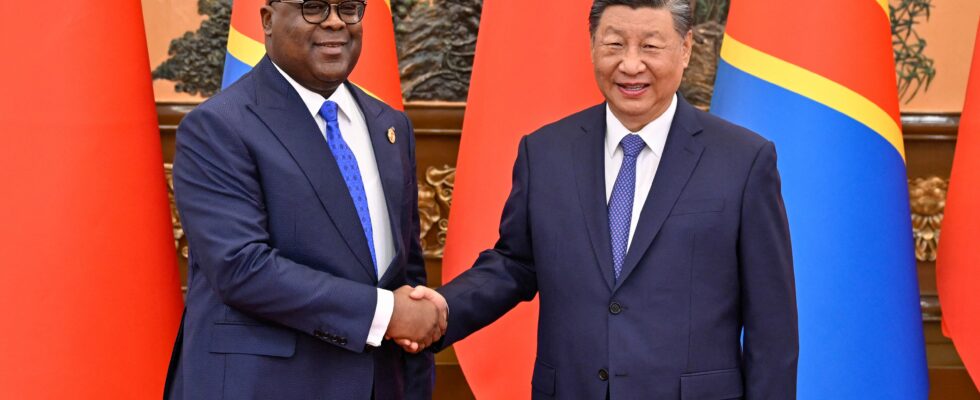China is trying to further strengthen its relationship with the African continent. Beijing is hosting leaders from across Africa in style starting Monday, September 2, for a five-day summit aimed at deepening ties with a region where Beijing’s large loans have enabled the construction of countless infrastructures, but also almost unlimited access to natural resources. Dozens of leaders and delegations are expected for this summit of the China-Africa Cooperation Forum scheduled to run until Friday and which will be, according to the Asian giant, the largest diplomatic event organized in the Chinese capital since the Covid-19 pandemic.
Over the past two decades, China has sent hundreds of thousands of workers and engineers to Africa to build these major projects, and to gain control of copper, gold and lithium in particular. Loans from Chinese public banks have helped finance many infrastructures designed to boost African growth (railways, ports, roads, etc.) but have also raised questions because they have also increased the debt of certain countries such as Zambia and Ethiopia. Indeed, Beijing is often accused of using its status as a creditor to extract diplomatic and commercial concessions, raising concerns about the ability of many African states to assume the debts incurred.
Furthermore, some projects could weaken local populations. For example, with the Ghana who will borrow $185.57 million [NDLR : 170 millions d’euros] to the China Development Bank to build 12 ports and landing points for fish products. While this initiative creates jobs, the fish hunted are mainly aimed at meeting Chinese demand for seafood, estimates the South China Morning PostRegardless, China, the world’s second-largest economy, remains their largest trading partner. Bilateral trade reached $167.8 billion (€151.8 billion) in the first half of 2024, according to Chinese state media.
South Africa and the DRC: major partners
Among the top partners is South African President Cyril Ramaphosa. He arrived early Monday morning in Beijing for a four-day visit to China, during which he will also visit the large metropolis of Shenzhen (south), the technological capital of the Asian giant. Trade between China and South Africa, a major economic power on the continent, reached $38.8 billion (€35.1 billion) in 2023, according to the South African presidency. According to his office, Cyril Ramaphosa is due to attend a welcoming ceremony on Monday hosted by Chinese President Xi Jinping at the Great Hall of the People in Beijing, the monumental building located on the edge of the famous Tiananmen Square where foreign leaders are welcomed.
The two countries will sign agreements on “strengthening economic cooperation and implementing technical cooperation,” according to the same source. Xi Jinping also met with Félix Tshisekedi, his counterpart from the Democratic Republic of Congo (DRC), on Monday, the official Xinhua news agency reported. China has a strong presence in the DRC, where it wants to exploit natural resources, including copper, gold, lithium and rare earths. It should be noted that the DRC already supplies more than 60% of China’s cobalt, a key component of batteries for electric and electronic vehicles, making it a key player in the Asian giant’s transition to green energy.
The Chinese president also pledged to consolidate “mutual political trust,” saying the two countries were “fellow travelers on the path of modernization and should be close friends with similar aspirations.” [et] mutual benefits.” However, their cooperation has already been hampered by insecurity. In July, at least four Chinese were killed in an attack in Ituri, a gold-rich province in the northeast of the central African country, local Congolese sources told AFP.
China’s tap could run dry
Meanwhile, leaders from Djibouti (home to China’s only overseas military base) as well as those from Equatorial Guinea, Nigeria, Mali and other countries also arrived in Beijing on Sunday and Monday. China’s loans to African countries last year hit a five-year high, according to a database compiled by Boston University. But the amount of the loans – $4.61 billion (€4.2 billion) – is down sharply from peaks of nearly $30 billion (€27 billion) in 2016. Analysts say the current economic slowdown in China is pushing Beijing to scale back its investment in Africa.
Finally, this week’s summit comes against a backdrop of growing competition between the United States and China in Africa, in terms of political influence and access to natural resources. Accustomed to presenting the Asian giant as its main rival, Washington regularly warns against what it presents as Beijing’s harmful influence on the continent. In 2022, the White House had thus estimated that China was seeking to “promote its own narrow commercial and geopolitical interests (and) to undermine transparency and openness”. Except that for the moment, African states do not have the means to turn a deaf ear.
